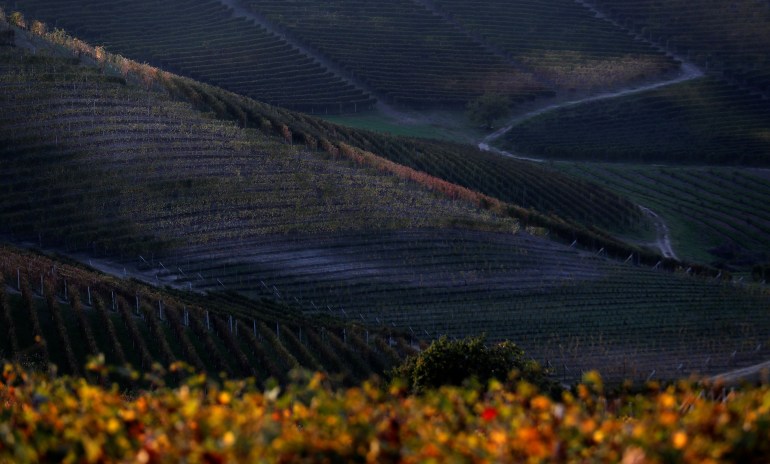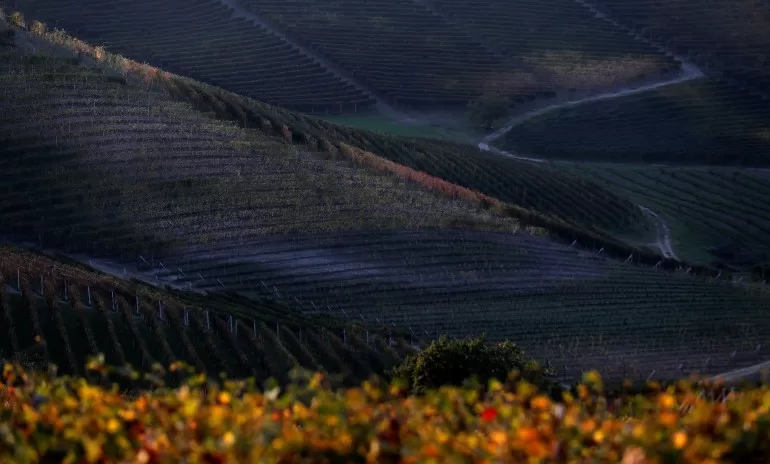Piedmont, Italy – One of the first words that Sajo* learned in the Langhe, Italy’s northeastern wine country, was “Anduma!”
In Piedmontese, the language spoken in the Piedmont region, it means “Let’s go!”
Sajo, a 36-year-old from The Gambia, used to hear it constantly while working 12-hour shifts in the vineyards, rain or shine, weekends included, for 3 euros ($3.27) to 4 euros ($4.36) an hour.
He had no contract and no legal status.
“Anduma!” his supervisors – local wine entrepreneurs and employees of wine production companies – yelled at him and at other African migrant workers as they picked grapes to produce Barolo and Barbaresco, two of Italy’s most expensive and most exported wines.
On average, a bottle of Barolo sells for 50 euros ($55), but prices for the highest quality can range from 200 euros ($220) to an eye-watering 1,000 euros ($1,090).
Called the new Tuscany, the Langhe – a UNESCO heritage site since 2014 – has been featured in the lifestyle pages of international newspapers and magazines, from The Wall Street Journal to The New York Times. The vineyard-covered hills of the Langhe are described as a dreamlike destination where “wine tastes like violets”.
One hectare (2.5 acres) of land can cost up to 1.5 million euros ($1.63m)
But for many living and working here, the reality is far from idyllic.
Since April, local authorities have uncovered more than 30 cases of “caporalato” in the Langhe vineyards, a form of exploitation in which migrant workers are recruited by intermediaries – often other migrants – and forced to work in inhumane conditions for Italian companies.
Union workers and activists believe this is just the tip of the iceberg.
Confagricoltura Cuneo, or the General Confederation on Italian Agriculture, estimated there are 2,500 viticulture companies that hire seasonal workers with various contracts. More than half of them are migrant workers, the group said.
Labour rights activists estimated 4,000 to 5,000 people work in the vineyards and at least two-thirds of them face the risk of exploitation.
Sajo arrived on the Sicilian coast in April 2015, dreaming of a good job that paid him enough to send money home to his wife and two children.
“I’m Muslim,” he told Al Jazeera. “I don’t even drink wine.”

Sajo was granted asylum but lost his status in 2018 when the Italian government passed the so-called Salvini decree – a law named after Matteo Salvini, leader of the far-right League party – which abolished humanitarian protections.
After his legal standing and, with it, his job and apartment were lost, Sajo began looking for casual work – day-labour jobs in agriculture. He slept rough and worked long hours for a few euros.
One day in 2021 while he was in Sicily for the olive harvest, another seasonal worker, also from The Gambia, told him of an opportunity in Alba, a small town in the heart of the Langhe.
It was grape season and a new workforce was needed.
As soon as Sajo got off the train in Alba, he was approached by a man, a so-called caporale, or gangmaster, who offered him a job in the vineyards.
In a mix of English and broken Italian, Sajo accepted wages of 3 euros ($3.27) an hour.
He settled in a small makeshift camp that had been built in the woods by other vineyard workers from Africa on a bank of the Tanaro river.
They had no toilets, no running water and no electricity. When they couldn’t afford bottled water, they used the muddy river water to wash themselves and cook.
“That was the hardest time since I left Gambia,” he said. “I couldn’t even recharge my phone. I couldn’t call home.”
Each day, Sajo woke before dawn and walked to the train station, where a gangmaster or one of his drivers picked him and others up in a van and drove them up into the hills to the vineyards.
The workers were constantly watched.
“We couldn’t take breaks to go to the restroom or drink water,” he said. The gangmaster’s men yelled at the farmhands to speed up and “threatened to fire us if we slowed down or spoke up”, he recalled.
Balla*, another undocumented worker from The Gambia, worked in the vineyards around Alba from 2021 to the end of last year.
“They called us bad names. Some even said racist words,” he said.
He said payments were often late and lower than what was promised.
“Some days, I didn’t have enough money to buy [food] for the next day,” he said. “When they paid you late, you couldn’t eat.”
Access to water in the vineyards was also inconsistent.
“Sometimes they gave me water. Sometimes they didn’t,” he said.
Matteo Ascheri, president of the Consorzio Barolo Barbarossa, the main organisation representing Barolo producers, acknowledged the perils of the caporalato system, saying he worried about the potential impact of an exploitation scandal on the Barolo brand.
“If a company breaks the law, it discredits all other companies,” he said. “It’s a huge problem.”
Exploitation in the Italian winemaking industry isn’t limited to the Langhe.
Caporalato in this sector traces back to the early 2000s when the government passed reforms that allowed labour outsourcing. A plethora of small intermediary companies were then able to offer cheaper manpower for hire in Italy’s wine country.
“Within three or four years, the labour organisation in the agriculture sector completely changed,” said Fabio Berti, a sociologist at the University of Siena who has researched exploitation in the Tuscan winemaking industry.
As international demand for Italian wine grew – international exports spiked by 74 percent from 2006 to 2016 – a lack of accountability and transparency requirements in subcontracting practices exposed workers to higher risks of exploitation, and undocumented workers were the most vulnerable.
“The system works so well that producers no longer have any direct contact with workers,” said Piertomaso Bergesio, a representative of CGIL, one of the country’s main unions. “The dirtiest part of the job is done by someone else [intermediary companies] who takes up the risks [of hiring them] and the opportunity of profiting off the back of people who are completely at their mercy.”
In recent years, caporalato cases have been documented in the northeast, where Prosecco is made, as well in the Chianti area. But compared with other sectors, there has been less scrutiny on vineyards.
Employment officials said investigating caporalato in the winemaking industry requires more resources because of the vastness of the hills where the vineyards are located.
But Bergesio and others believe there’s a code of silence.
“Nobody wants to talk about it,” said Francesca Pinaffo, a journalist in Alba who’s been reporting on exploitation cases in the Langhe wine country for the past three years. “Viticulture is a huge business.”
An anti-caporalato law that the Italian government approved in 2016 punishes convicted gangmasters with one to five years in jail and grants asylum to survivors who report them.
But experts said the implementation of the law is difficult.
Undocumented migrants are often afraid to file criminal complaints against their employers because it puts their incomes at risk.
“These criminal proceedings can take years, but these people need answers now. They need to send money home,” said Marco Paggi, a lawyer specialising in exploitation in the Prosecco industry.
Even when workers summon up the courage to report their exploiters, the law isn’t always implemented.
In 2022, Sajo reported his woes to local law enforcement. But his case fell through the cracks, and his asylum request was never processed. To this day, he doesn’t know if his affidavit led to an investigation.
But he has moved on, thanks to the help of local immigration rights activists. He has his legal status back and now has a job and an apartment.
“I see a future now,” he said.
Since Sajo filed his complaint, awareness has grown.
In late 2022, local officials launched an outreach project with labour inspectors and cultural mediators from the International Organization for Migration to inform migrant workers of their rights and support those who want to file legal complaints.
But experts said there is a long way to go.
“[Caporalato has] become a system to control labour costs. Companies have no interest in changing anything,” Paggi said.
